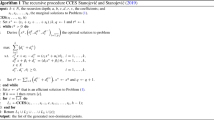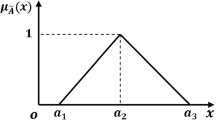Abstract
Based on the specified grades of satisfaction, we propose two new concepts of (α, β)-acceptable optimal solution and (α, β)-acceptable optimal value of a fuzzy linear fractional programming problem with fuzzy coefficients, and develop a method to compute them. An example is provided to demonstrate the method.
Similar content being viewed by others
References
C. R. Bector S. Chandra (2005) Fuzzy mathematical programming and fuzzy matrix games Springer-Verlag Berlin Heidelberg Occurrence Handle1078.90071
J.J. Buckley E. Eslami T. Feuring (2002) Fuzzy mathematics in economics and engineering Physica Verlag Heidelberg Occurrence Handle0986.03039
A. Charnes W.W. Cooper (1962) ArticleTitleProgramming with linear fractional functionals Naval Research Logistics Quarterly 9 181–186 Occurrence Handle0127.36901 Occurrence Handle152370
M. Chakraborty S. Gupta (2002) ArticleTitleFuzzy mathematical programming for multi-objective linear fractional programming problem Fuzzy Sets and Systems 125 335–342 Occurrence Handle1014.90085 Occurrence Handle1882894 Occurrence Handle10.1016/S0165-0114(01)00060-4
D. Dubois H. Prade (1983) ArticleTitleRanking fuzzy numbers in the setting of possibility theory Information Sciences 30 183–224 Occurrence Handle0569.94031 Occurrence Handle730910 Occurrence Handle10.1016/0020-0255(83)90025-7
D. Dutta J.R. Rao R.N. Tiwari (1993) ArticleTitleFuzzy approaches for multiple criteria linear fractional optimization : A comment Fuzzy Sets and Systems 54 347–349 Occurrence Handle1215578 Occurrence Handle10.1016/0165-0114(93)90381-Q
A. Kaufmann M.M. Gupta (1988) Fuzzy mathematical models in engineering and management science Elsevier Science Publishers B.V. Amsterdam Occurrence Handle0683.90024
A. Kaufmann M.M. Gupta (1991) Introduction to fuzzy arithmetic, theory and applications Van Nostrand Reinhold New York Occurrence Handle0754.26012
B. Metev D. Gueorguieva (2000) ArticleTitleA simple method for obtaining weakly efficient points in multiobjective linear fractional programming problems European Journal of Operational Research 126 386–390 Occurrence Handle0970.90104 Occurrence Handle1785803 Occurrence Handle10.1016/S0377-2217(99)00298-2
J. Ramik (2005) ArticleTitleDuality in fuzzy linear programming: Some new concepts and results Fuzzy Optimization and Decision Making 4 25–39 Occurrence Handle1079.90184 Occurrence Handle2127795 Occurrence Handle10.1007/s10700-004-5568-z
S. Schaible T. Ibaraki (1983) ArticleTitleFractional programming European Journal of Operational Research 12 325–338 Occurrence Handle0529.90088 Occurrence Handle703439 Occurrence Handle10.1016/0377-2217(83)90153-4
I.M. Stancu-Minasian (1999) ArticleTitleA fifth bibliography of fractional programming Optimization 45 343–367 Occurrence Handle1111.90300 Occurrence Handle1782410
I.M. Stancu-Minasian B. Pop (2003) ArticleTitleOn a fuzzy set approach to solving multiple objective linear fractional programming problem Fuzzy Sets and Systems 134 397–405 Occurrence Handle1026.90106 Occurrence Handle1962305 Occurrence Handle10.1016/S0165-0114(02)00142-2
R. Steuer (1986) Multiple criteria optimization–theory, computation, and application Wiley New York Occurrence Handle0663.90085
K. Swarup (1965) ArticleTitleLinear fractional functional programming Operations Research 13 1029–1036 Occurrence Handle0132.13802 Occurrence Handle10.1287/opre.13.6.1029
H.C. Wu (2003) ArticleTitleDuality theorems in fuzzy mathematical programming problems based on the concept of necessity Fuzzy Sets and Systems 139 363–377 Occurrence Handle1047.90082 Occurrence Handle2006781 Occurrence Handle10.1016/S0165-0114(02)00575-4
H.-J. Zimmermann (2001) Fuzzy set theory and its applications EditionNumber4 Kluwer Academic Publishers Nowell, MA Occurrence Handle0984.03042
Author information
Authors and Affiliations
Corresponding author
Rights and permissions
About this article
Cite this article
Mehra, A., Chandra, S. & Bector, C.R. Acceptable optimality in linear fractional programming with fuzzy coefficients. Fuzzy Optim Decis Making 6, 5–16 (2007). https://doi.org/10.1007/s10700-006-0021-0
Issue Date:
DOI: https://doi.org/10.1007/s10700-006-0021-0




